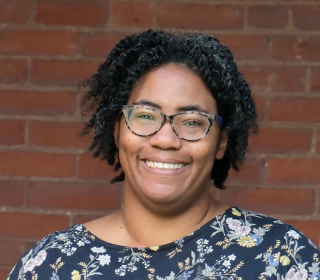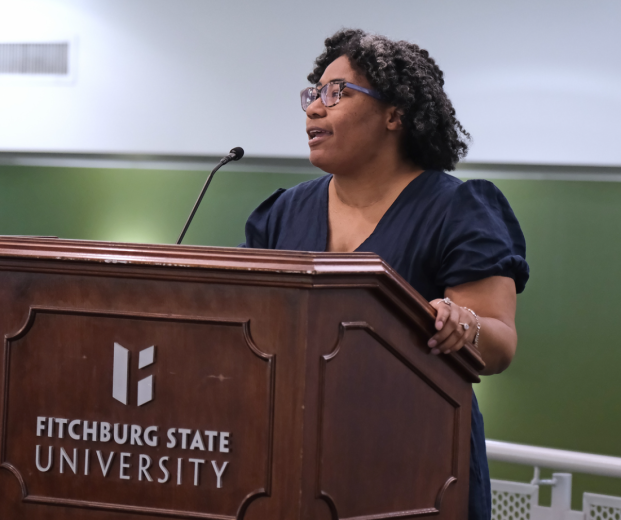Professor DeMisty Bellinger-Delfeld considers herself a creative writer first, and a scholar second. “Research feeds my writing and teaching,” she said. “And I love teaching. It’s a great way to support my writing habit.”
Bellinger-Delfeld has been supporting that habit with distinction as a member of the English Studies Department faculty since 2013. But supporting her writing through research dates back to her own educational training. Eager to prove her creative work had scholarly legitimacy and rigor, she plunged into research on literature and composition while pursuing her doctorate. Her dissertation ended up being her first historical novel.
“I fell in love with using people and documents and sources as inspiration,” she said. “I was never taught how to do that.”
The process of writing it inspired new avenues of inquiry, about how she could translate her own journey in the creation of her book to the classroom and her own students. The result was a new course on research for creative writers, which remains a staple in her department.
The absence of such formal training inspired Bellinger-Delfeld to create a course on research for creative writing. “In creative work, a lot of things we choose to look into are those ‘what if’ questions,” she said.
Her own scholarly work continues, with a focus on equity and issues surrounding race, class and gender, from the “me-too” movement and the still-unfolding impact of the Supreme Court’s decision to overturn Roe v. Wade to the feelings of helplessness so many feel about the impact of climate change. This work informs her teaching with a continual redesign of courses with a goal of serving her students in an equitable way.
In some aspect, I believe all writing is persuasive and most creative writing is, to a certain extent, political.
To fuel her students’ interests and broaden their horizons, she began assigning them readings from The New York Times, from which they generate ideas for their own works.
“Our students are great, they’re very creative,” she said. “You see them work through things and you see them grow.”
Her colleagues and peers in the creative writing community hold her scholarship, creative writing and criticism, and student-centered approach to teaching in the highest regard. She is lauded for her commitment to ensuring diversity, equity, and inclusion within academic creative writing programs, and is seen as an expert in her teaching of these topics.
“Addressing inequities in creative work is difficult if you want to avoid being blatantly didactic and not compromise the artistic merits,” Bellinger-Delfeld said. “In some aspect, I believe all writing is persuasive and most creative writing is, to a certain extent, political.”
“Surfeit,” a recent poem, addresses the helplessness the majority of Americans feel in the face of climate change:
This is where we are now:
I dreamt of mold spreading
throughout our house. It grew,
soft and bunny fuzzy white
beneath dishes, in the sink,
on the back of our hands.
In real, waking life,
mold grows atop the moss
outside because it won’t stop
raining. And when the sun
shines, it’s humid and hot.
And when it doesn’t rain—
I imagine fungus, mold
overtaking a mistreated earth
growing between our toes
or in patches of ringworm
on our faces. We know the biggest
organism is a kind of mushroom,
expanding underground.
This armillaria,
this honey fungus, covers
acres and is older than
the oldest tree or tortoise.
This is where we are now:
sweating in a deluge
of hurricane rains,
practicing the Sisyphean
task of ridding ourselves
of tenacious growth.

